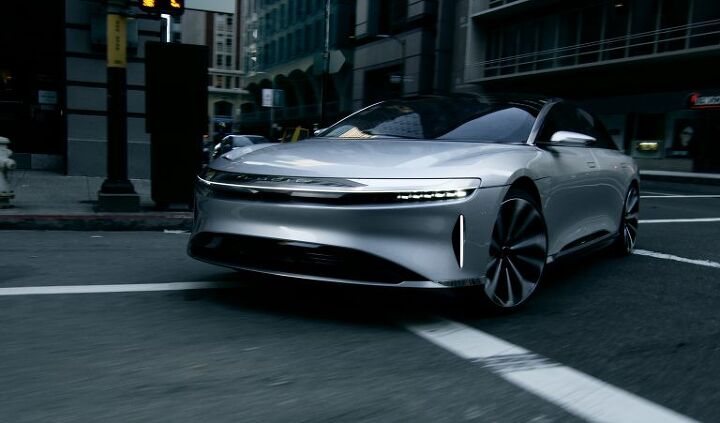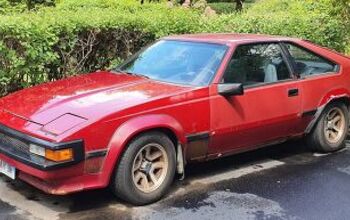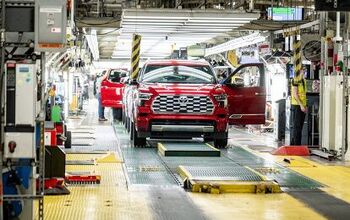Lucid Motors Reportedly Considered Selling Itself to Ford; Fundraising Continues

It’s the dream of every startup to bring forth an exciting idea and then allow itself to be purchased by a much larger and less imaginative company to ensure the concept never reaches fruition. Lucid Motors, one of the few automotive startups attempting to temper hype with reasonable expectations, is approaching that dream as rumors of its attempt to sell itself to a larger automaker begin to proliferate.
While most of the talk surrounding the potential sale of the company is just that, Lucid has been desperately seeking funding for the production of its electric car in Arizona. Unnamed inside sources claim the company reached out to Ford Motor Company and even held preliminary takeover talks.
If Ford bought Lucid, it’s difficult to imagine what the company’s Air EV would evolve into. It’s doubtful it would perfectly resemble the much-showcased concept vehicle. However, according to Bloomberg, the Blue Oval isn’t interested in making any deals at this time. The automaker has declined to comment on the matter.
The California-based Lucid Motors doesn’t want to discuss the funding of its project beyond confirming it’s still hunting for financial backing. “We don’t have the money in place. That’s why we need to secure Series D,” Chief Technology Officer Peter Rawlinson explained at this year’s New York International Auto Show. “It would be irresponsible to start moving earth or start anything until we have a financial runway to execute that professionally and with absolute integrity.”
Having seen how poorly that strategy worked for Faraday Future, it’s unsurprising Lucid would employ some common sense in its proceedings. But that means it needs financial assistance to move forward on the project, and the Arizona factory is reported to cost around $700 million. Reaching out to us, Lucid Motors specified it would be building the plant in three phases — the first of which would require a $240 million investment. That early site is anticipated to have a production capacity of between 8,000 and 10,000 vehicles per year. By the end, the company wants the completed facility churning out 130,000 annual units by 2022.
The world may not need Lucid’s 235 mph electric super sedan, but it would certainly be a more interesting place with it on the road. With Faraday’s prospective automobile seeming like an impossibility, it might be nice to see at least one EV startup get out there and mix it up with Tesla Motors. But that could still be a long way off.
Even if Ford has a sudden change of heart and spends the same kind of money on Lucid as it did on A.I. startups, production could still be years away. There’s a production vehicle at the ready, but the startup refuses to break ground on its factory without the money in place.
Initially, Lucid Motors hoped to begin production of the $60,000 Air by 2018, but extended that timeline to 2019 after funding fears surfaced. In an interview with Bloomberg, Rawlinson claimed to be “thrilled with the response from investors.” However, he declined to comment on the current scale of the fundraising or any discussions had with Ford.
[Image: Lucid Motors]

A staunch consumer advocate tracking industry trends and regulation. Before joining TTAC, Matt spent a decade working for marketing and research firms based in NYC. Clients included several of the world’s largest automakers, global tire brands, and aftermarket part suppliers. Dissatisfied with the corporate world and resentful of having to wear suits everyday, he pivoted to writing about cars. Since then, that man has become an ardent supporter of the right-to-repair movement, been interviewed on the auto industry by national radio broadcasts, driven more rental cars than anyone ever should, participated in amateur rallying events, and received the requisite minimum training as sanctioned by the SCCA. Handy with a wrench, Matt grew up surrounded by Detroit auto workers and managed to get a pizza delivery job before he was legally eligible. He later found himself driving box trucks through Manhattan, guaranteeing future sympathy for actual truckers. He continues to conduct research pertaining to the automotive sector as an independent contractor and has since moved back to his native Michigan, closer to where the cars are born. A contrarian, Matt claims to prefer understeer — stating that front and all-wheel drive vehicles cater best to his driving style.
More by Matt Posky
Latest Car Reviews
Read moreLatest Product Reviews
Read moreRecent Comments
- Doug brockman There will be many many people living in apartments without dedicated charging facilities in future who will need personal vehicles to get to work and school and for whom mass transit will be an annoying inconvenience
- Jeff Self driving cars are not ready for prime time.
- Lichtronamo Watch as the non-us based automakers shift more production to Mexico in the future.
- 28-Cars-Later " Electrek recently dug around in Tesla’s online parts catalog and found that the windshield costs a whopping $1,900 to replace.To be fair, that’s around what a Mercedes S-Class or Rivian windshield costs, but the Tesla’s glass is unique because of its shape. It’s also worth noting that most insurance plans have glass replacement options that can make the repair a low- or zero-cost issue. "Now I understand why my insurance is so high despite no claims for years and about 7,500 annual miles between three cars.
- AMcA My theory is that that when the Big 3 gave away the store to the UAW in the last contract, there was a side deal in which the UAW promised to go after the non-organized transplant plants. Even the UAW understands that if the wage differential gets too high it's gonna kill the golden goose.


































Comments
Join the conversation
Is this like Marchionne looking for a buyer for FCA?
To sell a product you have to offer value to the purchaser, and a opportunity for that purchaser to turn the transaction into profit. It is hard to see how Lucid could offer all that to Ford.